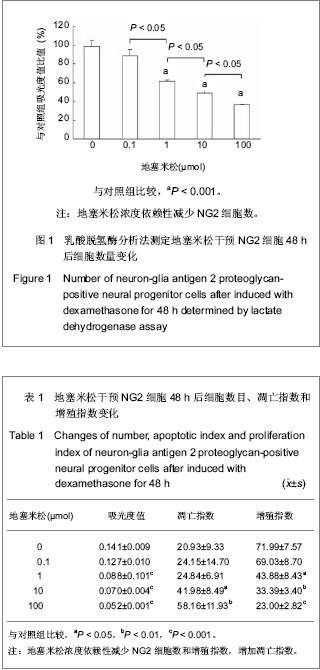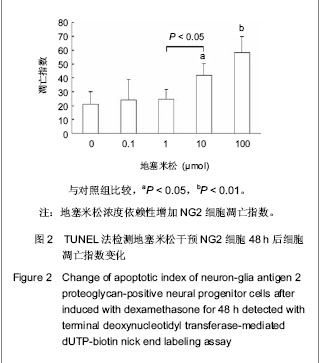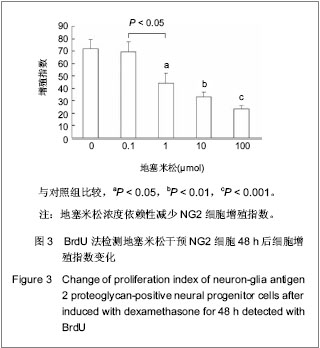| [1] Li MQ,Wang YY,Yu ZP. Chongqing Yixue. 2006; 35(12):1124- 1126.李茂全,王艳艳,余争平.糖皮质激素对海马功能损伤机制的研究进展[J].重庆医学,2006, 35(12):1124-1126.[2] Gurvits TV, Shenton ME, Hokama H,et al. Magnetic resonance imaging study of hippocampal volume in chronic, combat-related posttraumatic stress disorder.Biol Psychiatry. 1996;40(11):1091-1099.[3] Newcomer JW, Selke G, Melson AK,et al. Decreased memory performance in healthy humans induced by stress-level cortisol treatment. Arch Gen Psychiatry. 1999;56(6):527-533.[4] Sapolsky RM.Why stress is bad for your brain.Science. 1996; 273(5276):749-750.[5] Van der Borght K, Meerlo P, Luiten PG,et al. Effects of active shock avoidance learning on hippocampal neurogenesis and plasma levels of corticosterone. Behav Brain Res. 2005; 157(1):23-30.[6] Sun HY,Zhang JN,Yang SY,et al. Zhonghua Shenjing Waike Jibing Yanjiu Zazhi. 2004;3(1):52-55.孙红宇,张建宁,杨树源,等.糖皮质激素对大鼠内源性神经前体细胞增殖的影响[J]. 中华神经外科疾病研究杂志,2004,3(1): 52-55.[7] Huang WL, Harper CG, Evans SF, et al. Repeated prenatal corticosteroid administration delays astrocyte and capillary tight junction maturation in fetal sheep. Int J Dev Neurosci. 2001;19(5):487-493.[8] Huang WL, Harper CG, Evans SF, et al. Repeated prenatal corticosteroid administration delays myelination of the corpus callosum in fetal sheep. Int J Dev Neurosci. 2001;19(4): 415-425.[9] Reagan LP, McEwen BS. Controversies surrounding glucocorticoid-mediated cell death in the hippocampus. J Chem Neuroanat. 1997;13(3):149-167.[10] Ma Q,Yang ZH,Chao FH. Zhongguo Yingyong Shenglixue Zazhi. 2001;17(1):29-32.马强,杨志华,晁福寰.过量皮质酮致原代培养的大鼠海马神经元死亡方式的研究[J].中国应用生理学杂志,2001,17(1):29-32.[11] Zhang JN,Sun HY,Yang SY,et al. Zhongguo Shenjing Jingshen Jibing Zazhi. 2003;29(3):196-198.张建宁,孙红宇,杨树源,等.糖皮质激素对大鼠海马神经元影响的体外研究[J].中国神经精神疾病杂志,2003,29(3):196-198.[12] Zhang L, Kokkonen G, Roth GS. Identification of neuronal programmed cell death in situ in the striatum of normal adult rat brain and its relationship to neuronal death during aging. Brain Res. 1995;677(1):177-179.[13] Hassan AH, von Rosenstiel P, Patchev VK, et al. Exacerbation of apoptosis in the dentate gyrus of the aged rat by dexamethasone and the protective role of corticosterone. Exp Neurol. 1996;140(1):43-52.[14] Belachew S, Chittajallu R, Aguirre AA, et al. Postnatal NG2 proteoglycan-expressing progenitor cells are intrinsically multipotent and generate functional neurons. J Cell Biol. 2003;161(1):169-186.[15] Nunes MC, Roy NS, Keyoung HM, et al. Identification and isolation of multipotential neural progenitor cells from the subcortical white matter of the adult human brain. Nat Med. 2003;9(4):439-447. [16] Lin SC, Huck JH, Roberts JD, et al. Climbing fiber innervation of NG2-expressing glia in the mammalian cerebellum. Neuron. 2005;46(5):773-785.[17] Greenwood K, Butt AM. Evidence that perinatal and adult NG2-glia are not conventional oligodendrocyte progenitors and do not depend on axons for their survival. Mol Cell Neurosci. 2003;23(4):544-558.[18] Yu XJ,Tatebayashi Yoshitaka,Guo L.Nao yu Shenjing Jibing Zazhi. 2009;17(4):261-264.于秀军,楯林義孝,郭力.从成年大鼠海马分离培养NG2蛋白聚糖阳性神经祖细胞的新方法[J].脑与神经疾病杂志,2009,17(4): 261-264.[19] Li X,Yang R,Zang Q,et al. Guoji Yaoxue Yanjiu Zazhi. 2009; 36(1):27-30.李鑫,杨蕊,臧强,等.糖皮质激素的药理作用机制研究进展[J].国际药学研究杂志, 2009, 36(1):27-30.[20] Geng ZY,Xu WP. Anhui Yiyao. 2009;13(2):120-122.耿甄彦,徐维平.抑郁症相关受体作用机制的研究进展[J].安徽医药,2009,13(2):120-122.[21] Holsboer F, Ising M. Central CRH system in depression and anxiety--evidence from clinical studies with CRH1 receptor antagonists. Eur J Pharmacol. 2008;583(2-3):350-357.[22] Starkman MN, Gebarski SS, Berent S, et al. Hippocampal formation volume, memory dysfunction, and cortisol levels in patients with Cushing's syndrome. Biol Psychiatry. 1992;32(9): 756-765.[23] Landfield PW, Eldridge JC. Evolving aspects of the glucocorticoid hypothesis of brain aging: hormonal modulation of neuronal calcium homeostasis. Neurobiol Aging. 1994;15(4):579-588.[24] van Rossum EF, Binder EB, Majer M, et al. Polymorphisms of the glucocorticoid receptor gene and major depression.Biol Psychiatry. 2006;59(8):681-688.[25] Lucassen PJ, Müller MB, Holsboer F, et al. Hippocampal apoptosis in major depression is a minor event and absent from subareas at risk for glucocorticoid overexposure. Am J Pathol. 2001;158(2):453-468.[26] Sapolsky RM. Glucocorticoids and hippocampal atrophy in neuropsychiatric disorders. Arch Gen Psychiatry. 2000;57(10): 925-935.[27] Santarelli L, Saxe M, Gross C, et al. Requirement of hippocampal neurogenesis for the behavioral effects of antidepressants.Science. 2003;301(5634):805-809.[28] Jacobs BL, van Praag H, Gage FH. Adult brain neurogenesis and psychiatry: a novel theory of depression. Mol Psychiatry. 2000;5(3):262-269.[29] Van der Borght K, Meerlo P, Luiten PG,et al. Effects of active shock avoidance learning on hippocampal neurogenesis and plasma levels of corticosterone. Behav Brain Res. 2005;157 (1):23-30.[30] Wennström M, Hellsten J, Tingström A. Electroconvulsive seizures induce proliferation of NG2-expressing glial cells in adult rat amygdala. Biol Psychiatry. 2004;55(5):464-471.[31] Wennström M, Hellsten J, Ekdahl CT,et al. Electroconvulsive seizures induce proliferation of NG2-expressing glial cells in adult rat hippocampus.Biol Psychiatry. 2003;54(10): 1015-1024. |


